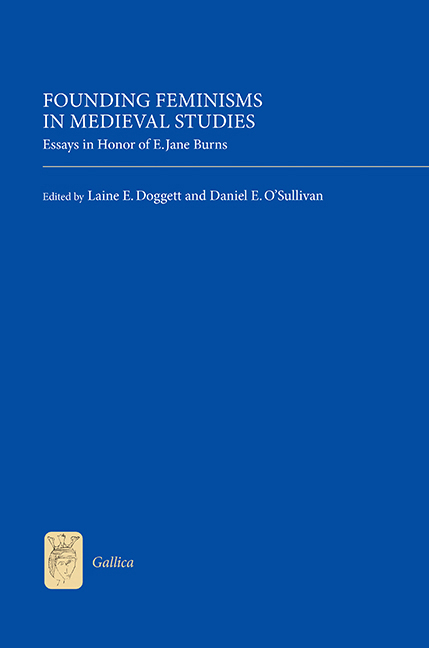Book contents
- Frontmatter
- Contents
- List of Illustrations
- List of Contributors
- Acknowledgements
- Introduction: The Work of E. Jane Burns and the Feminisms of Medieval Studies
- E. Jane Burns: A Bibliography
- Part I Debating Gender
- Natural and Unnatural Woman: Melusine Inside and Out
- Nurturing Debate in Le Roman de Silence
- The Man Backing Down from the Lady in Trobairitz Tensos
- Having Fun with Women: Why a Feminist Teaches Fabliaux
- Part II Sartorial Bodies
- Part III Mapping Margins
- Part IV Female Authority: Networks and Influence
- Afterword: A Response to the Volume
- Index
- Tabula Gratulatoria
- Already Published
The Man Backing Down from the Lady in Trobairitz Tensos
from Part I - Debating Gender
Published online by Cambridge University Press: 05 July 2016
- Frontmatter
- Contents
- List of Illustrations
- List of Contributors
- Acknowledgements
- Introduction: The Work of E. Jane Burns and the Feminisms of Medieval Studies
- E. Jane Burns: A Bibliography
- Part I Debating Gender
- Natural and Unnatural Woman: Melusine Inside and Out
- Nurturing Debate in Le Roman de Silence
- The Man Backing Down from the Lady in Trobairitz Tensos
- Having Fun with Women: Why a Feminist Teaches Fabliaux
- Part II Sartorial Bodies
- Part III Mapping Margins
- Part IV Female Authority: Networks and Influence
- Afterword: A Response to the Volume
- Index
- Tabula Gratulatoria
- Already Published
Summary
In troubadour love songs (cansos) the lady, a fiction conceived in the mind of the poet, is molded in language and recognizable through poetic tradition and convention. The poet proclaims from center stage his longing for his lady, a desire that manifests outwardly in songs of praise that describe her indescribable beauty. The idealized lady is ephemeral, even chimerical, and the poet's quest is essentially a self-fulfilled prophecy: he sings because he does not possess his love object, and so he sings all the more. Despite his faithful service, he, the lover, is a victim, and his beloved a victimizer. E. Jane Burns persuasively analyzes the troubadour's position in Bernart de Ventadorn's cansos as follows:
The voice of the Provençal troubadour, set adrift between private and public worlds, hovers uncertainly between natural desire and its domesticated expression in song, between the hope of making contact with the woman and the impossibility of even achieving such contact through the only means available to him. The song he composes tends to objectify and distance the desired woman; it can neither secure nor wholly substitute for sexual gratification.
The male-authored canso is narcissistic in nature: while it may be ostensibly about the praiseworthy Other, it's really about the praising Self. At the same time, the desire that the poet expresses over and over again remains, must remain, unfulfilled, for were the poet to accomplish his goal, the love quest would end. Thus all while the male poet coaxes, cajoles, and swears never to accept defeat, he knows that he cannot accept victory either. Burns puts it succinctly:
[P]oetic creation is generally motivated by the Lady's rebuke; the choice of the poet to be a composer of love songs depends precisely on his not being loved. It is in this sense that longing for the Lady becomes more valuable to him psychologically and professionally than the possession of her, and the mal d'amour can function as le plus grand bien.
More than a narcissist, the troubadour is a masochist. Amorous satisfaction would bring about poetic nullification, for the pain he feels, his ultimate source of inspiration, would cease, and silence would ensue. Sure, he could seek out other quarry, but then his proclamations of loving only one and the best woman for ever and ever would indeed ring hollow.
- Type
- Chapter
- Information
- Founding Feminisms in Medieval StudiesEssays in Honor of E. Jane Burns, pp. 45 - 60Publisher: Boydell & BrewerPrint publication year: 2016

